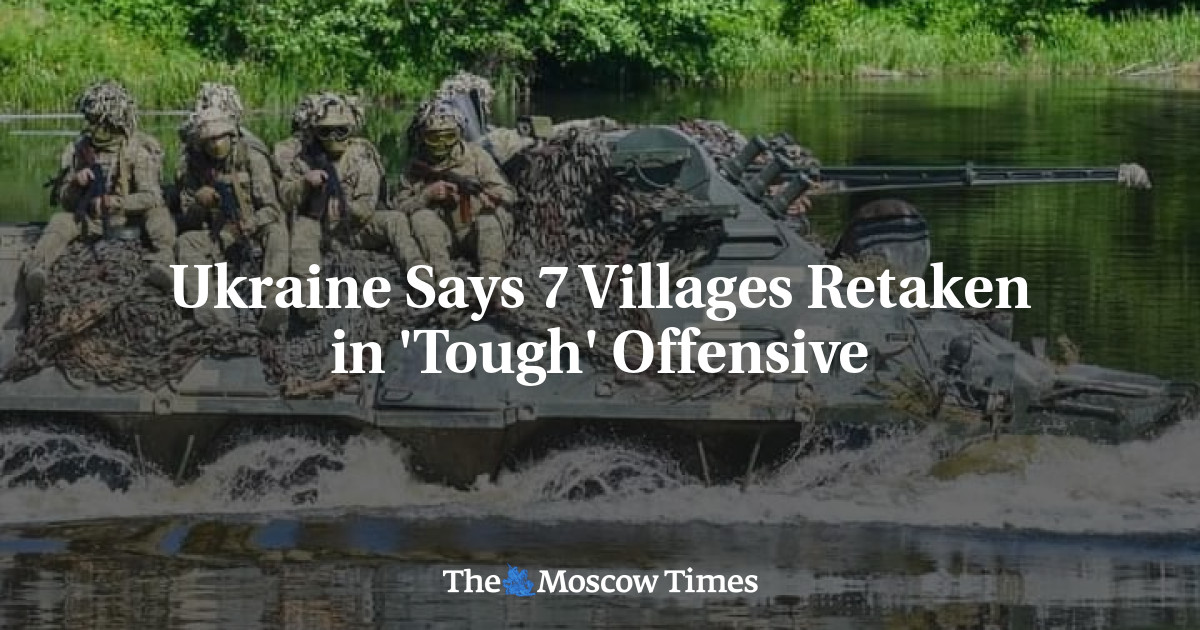
Ukraine on Monday said it had retaken seven villages and made small gains in a “tough” counter-offensive against Russian forces that France said could last months.
“The fighting is tough, but we are moving forward, this is very important,” Ukrainian President Volodymyr Zelensky said in a daily evening address.
“I thank our guys for every Ukrainian flag that is now returning to its rightful place in villages on the newly de-occupied territory,” he said.
French President Emmanuel Macron said the long-awaited campaign, with weapons donated by Western allies, would be underway for weeks if not months.
“We want it to be as successful as possible so that we can then start a negotiation phase in good conditions,” he said in Paris, speaking alongside German Chancellor Olaf Scholz and Polish President Andrzej Duda.
Duda said the Western military alliance NATO had to “send a clear signal” about Ukraine’s desperate quest to join the bloc at its next summit on July 11 and 12 in Vilnius.
U.S. Secretary of State Antony Blinken voiced hope that the offensive would force Russian President Vladimir Putin into talks about ending its invasion.
He said the United States was “confident that they will continue to have success.”
Ukraine’s deputy defense minister Ganna Malyar said on Telegram on Monday that “seven settlements were liberated” — referring to the villages of Lobkovo, Levadne and Novodarivka in the southern Zaporizhzhia region, which houses Europe’s largest nuclear plant, now under Russian occupation.
Malyar said Ukrainian forces had also regained control of the village of Storozheve in the south of the Donetsk region, near three villages recaptured on Sunday.
“The area of the territory taken under control amounted to 90 square kilometers,” Malyar said.
The Ukrainian defense ministry meanwhile said its forces had advanced “250 to 700 meters” in the direction of the flashpoint eastern city of Bakhmut.
Russia said earlier Monday that it repelled Ukrainian attacks in the same area in the Donetsk region near Velyka Novosilka.
It also said it fought off Ukrainian attacks around the village of Levadne in Zaporizhzhia region.
The claims by Moscow and Kyiv could not by verified independently.
“Ukrainian forces made visually verified advances in western Donetsk Oblast and western Zaporizhzhia Oblast, which Russian sources confirmed but sought to downplay,” the U.S.-based Institute for the Study of War said in an analytical note Monday.
As Ukraine announced gains, Putin visited soldiers wounded in Ukraine in a rare face-to-face meeting in a hospital in Moscow.
The Kremlin aired images of Putin wearing a dark suit and accompanied by Defense Minister Sergei Shoigu in military attire.
The officials stood in front of a row of men in blue hospital outfits, some of them in wheelchairs.
Flood death toll rises
In southern Ukraine, two more civilian bodies were found drowned in the heavily flooded city of Kherson, raising the death toll to 10 on the Ukrainian-controlled side of the Dnipro river after the Kakhovka dam was breached.
Officials warned dozens were still missing.
“Currently, we know about 10 dead in Kherson and the region,” Ukrainian Interior Minister Igor Klymenko said on Telegram.
“We are also reporting 41 people as missing.”
The governor of the Kherson region said two bodies — one a woman and the other a man — were found on Monday in the regional capital.
A day earlier, Oleksandr Prokudin said three people were killed as Russia shelled a rescue boat evacuating people after the devastating floods.
Kyiv has accused Moscow of blowing up the dam on the Dnipro River, while Russia has blamed Ukraine.
The chief of the International Atomic Energy Agency, Rafael Grossi, will arrive in Kyiv on Tuesday to meet Zelensky before heading to the Zaporizhzhia nuclear power plant.
The Russian-held Kakhovka dam forms a reservoir that provides the cooling water for the Russian-occupied plant.
Later this week, several African heads of state will take part in a mediation mission to Kyiv and Moscow.
Republic of Congo President Denis Sassou Nguesso said Monday that Africa could not “remain silent or indifferent” in the face of the conflict in Ukraine.